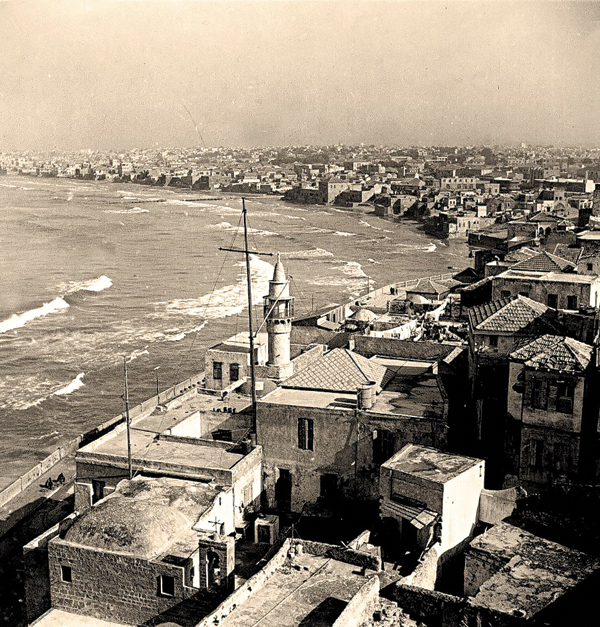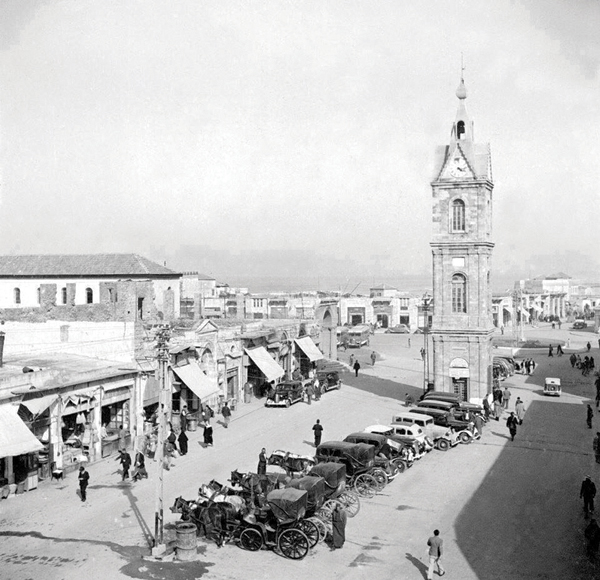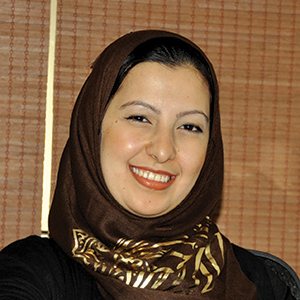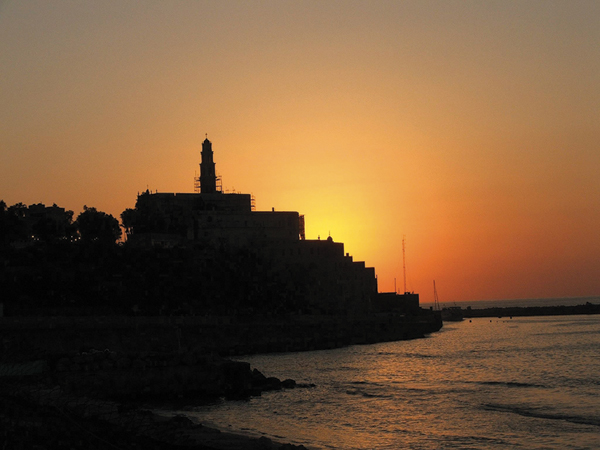
The respect for an 80-year-old man should have been enough to make me hesitate and be content with a handshake rather than a kiss. It should have left me embarrassed to throw myself into his arms right away.
My exiled uncle.
My uncle the refugee.
I met my maternal uncle last summer for the first time while I was in Amman, the Jordanian capital, on a short trip with my almost-three-year-old daughter. He was making a summer visit to Amman from Doha, his place of residence.
My uncle was born in the Nuzha Quarter of the splendid city of Jaffa that lies proudly and temptingly on the Mediterranean coast. Together with his siblings and parents he left his home for Gaza following the Nakba in 1948. Later on, each one of the siblings was forced to choose a temporary place of residence in one of the various Arab countries.
When I found out that my uncle was in Amman, I hurriedly packed my belongings, dropping things left and right as my hands were trembling with excitement, and left the hotel where I had been staying to meet him at his Jordanian summer home.
Confused feelings and ideas raced through my brain and jolted my heart. I would meet a member of my mother’s family in person rather than through virtual communication channels! “Oh Lord, is this possible?” I thought. “I will meet my mother’s eldest brother; the brother she has not seen in forty years, the one she speaks about whenever we sit at our dining table and enjoy grilled meat or sausages. After all, he had been the owner of the first grilled-meat restaurant in Jaffa.”
At our first encounter, his eyes anxiously darted right and left, as if he were still searching for me. We were shaken with grief, agony, and joy. Tears flooded our eyes as we hugged each other intensely – as if we were compensating for 69 years of Nakba, 40 years of exile, and my lifetime of separation.

We wanted to turn time back to the old Jaffa, gather up fallen oranges from between our feet, and smell the white jasmine that my grandfather used to hide carefully in his dark-red tarbush. Like the children back then, I wanted to listen to my grandmother’s soft classy voice asking my grandfather to go and fetch ripe tomatoes from the market – my mother had told me these childhood stories many times.
As the fast pulse of our hearts was slowing down again, beating as if it were united with the tick-tock of the old clock tower on Jaffa’s Shuhada Square, we cursed the Nakba, the smell of the refugee tents, and the old key that hangs on our living room wall – from deep inside and with a wounded, silenced voice.
My uncle is a respectable person, and despite his old age, he has strong, vivid memories of Jaffa, Gaza, Palestine, and its history. He walks with a straight back and holds his head high. His fresh skin has few wrinkles. He seems wise and calm, so much so that I felt a deep regret about what the Nakba and the Naksa (occupation in 1967) had brought upon us. Had he been among us, I would have consulted him about so many decisions in my life, at times even about what to cook on a particular day.
Later that night, my uncle said, “See, dear niece, I do not cry often, but when I saw you stepping out of the car with your daughter, I remembered your mother, whom I left when she was as young as your daughter is now. And after all these years, I still am not able to meet or see her. But at least I can now meet my niece and my sister’s granddaughter. Seeing you this morning was as if the past 69 years had been summed up in one moment.”
“What is happening to us Palestinians is so very disheartening,” he continued. “The more anniversaries of the Nakba we commemorate, the more years of our lives and of the lives of our grandchildren we lose, because we spend them without knowing each other. See, dear niece, should they give me a door that opens to two tiles (i.e., tiny rooms) in Jaffa, this would be dearer and better for me than all the castles of the world or the villas I live in.”
“When I meet people from Jaffa, the one thing of which I am certain is that since the old times of our ancestors, we have been sharing a common trait that is passed on through the generations: our love of life and our optimism when things are tough. People from Jaffa always see that good will beat evil, and thus we live with enduring happiness.”
“We love flowers, whether natural or artificial; we love the blue color of the sky and give full freedom to our sense of joy. Only the sky is our limit. We prepare for emergencies and stay calm in times of peace or war, never tiring of the sweet and bitter sides of life. We cook our food on a gentle fire and take good care in adding spices, always looking for ways to improve the taste even more. We are never satisfied until things are perfect and complete.”
Though generous, hospitable, and kind, people from Jaffa do not like waste; they are creative in saving food and mending clothes… They do not throw away food – neither its remains nor its byproducts. Everything is used; sometimes by adding new ingredients to make its taste acceptable for their children who crawl at their feet in the kitchen. The people of Jaffa cuddle their children and do not oppress them, nor do they take strict measures of punishment against them. They give their advice and guidance while leaving space for the children to grow at their own pace.
Citrus fruits, mainly oranges, are consumed in their entirety; even the peel is used in ways that they have learned from their fathers and grandfathers. Jaffans only throw away the seeds.
The people of Jaffa take generous care of their guests, even if this burdens their monthly budget. The town has traditionally been known as “the mother of strangers,” famous for the hospitality of its inhabitants, who are a people of the Mediterranean coast and of trade: the comfort of their guests is more important to them than their own. They have a strong sense of honor, particularly when they get old and tend to behave in a manner that reflects their dignity. An elderly person once confided: “I wish, while I’m still alive, that I could organize my own funeral and the way the mourners would come to express their condolences.”
In Jaffa, people stay up all night to have more time to engage with life. During summer nights, they blossom and thrive. Chatting and talking from their balconies – which are usually overflowing with pottery, plastic, or metal pots that hold flowers and aromatic herbs – they sip mint tea and nibble traditional white cheese in sandwiches or with slices of sweet watermelon. They like to pamper themselves with fine clothes and soft scents, and take care to comply with the latest fashion. In winter, you will find Jaffa’s dwellings warm and cozy, and when you enter people’s homes, the cold leaves not only your body but also your soul.
Jaffa’s citizens have a unique dialect that speaks of the long-standing culture that has enriched this beautiful town for centuries. But the best word of Jaffa’s inhabitants contains no letter of the alphabet: it is the “Jaffa snort,” an expression of deep anger or strong objection.
I stay in touch with my uncle through social media. But having spent these few days face-to-face with him in Amman, our interaction has changed. He still sends me a “dry” electronic kiss over his mobile phone, and I assure him that “it arrived,” although really it has not, and sent this way, it simply never could. Such short and ephemeral meetings in virtual space with close relatives impair natural family relations and hit the very nerve of humanity. They are a shame in a world that remains silent in front of the systematic prolongation of the Israeli occupation, which is reborn every day with new generations that are still bound by the Nakba.
The good Lord has made it possible this last winter for my mother to leave Gaza and see my uncle and a number of her siblings in Doha. She spent 20 days with them, staying up around the clock to talk and dig up cherished memories, searching for all the little details. Then they wished each other farewell, hoping that they would meet again but not knowing whether, when, or where this would be possible.
» Samar Al-Dreamly is an award-winning freelance journalist from Gaza, the coordinator of media programing in the Women’s Affairs Center in Gaza, and the secretary editor of the center’s Al Ghaidaa Magazine. Samar is vice chair of Community Media Center and a member of the International Federation of Journalists, the Palestinian Journalists’ Syndicate, and the general assembly for Addameer Prisoner Support and Human Rights Association.



